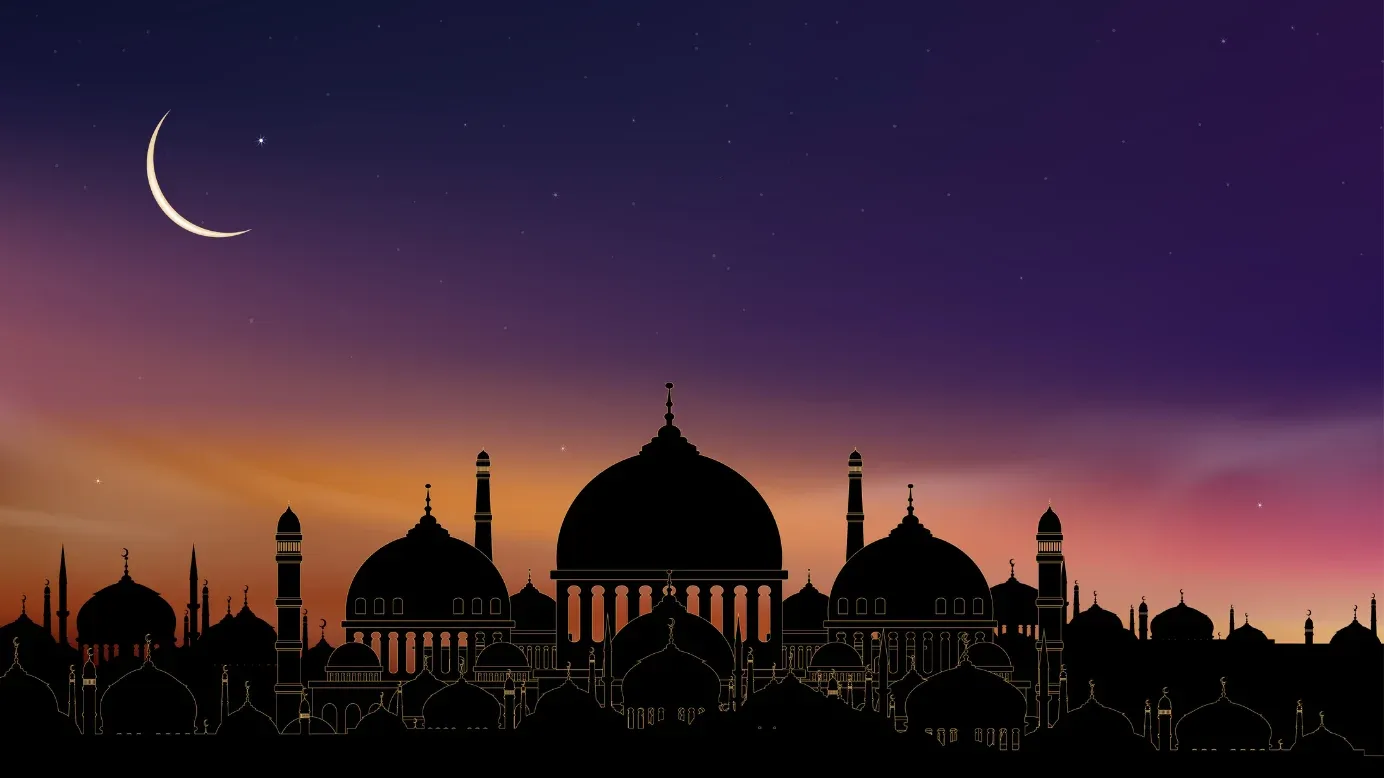Celebrar el Ramadán: 15 ideas para celebrar actos significativos en el lugar de trabajo
Celebre el Ramadán en el lugar de trabajo con 20 ideas de actos significativos, que fomentan la inclusión, la comprensión y el espíritu de comunidad entre los compañeros.
En esta página
El Ramadán, el mes más sagrado del calendario islámico, es un tiempo de reflexión espiritual, autodisciplina y comunidad. Para los musulmanes de todo el mundo, es un periodo marcado por el ayuno, la oración y los actos de caridad.
Más allá de su significado religioso, el Ramadán sirve para que las personas profundicen en su conexión con la fe, la familia y la comunidad. Cuando la luna creciente anuncia el comienzo del Ramadán, las comunidades se reúnen para observar este mes sagrado de diversas maneras, fomentando la unidad, la compasión y la comprensión.
Está previsto que el Ramadán comience el lunes 11 de marzo y se prolongue hasta el miércoles 10 de abril, finalizando con la celebración del Eid al-Fitr.
Importancia de celebrar el Ramadán
El Ramadán tiene un profundo significado en el Islam, ya que conmemora el mes en que el Corán, el libro sagrado del Islam, fue revelado al Profeta Muhammad (la paz sea con él).
Los musulmanes ayunan desde el amanecer hasta la puesta del sol, practicando la autodisciplina y la empatía con los menos afortunados. Mediante el ayuno, los musulmanes se esfuerzan por purificar sus almas, buscar el perdón y acercarse a Alá.
Datos sobre el Ramadán
- El Ramadán es el noveno mes del calendario lunar islámico, conocido como calendario Hijri.
- El ayuno durante el Ramadán es uno de los Cinco Pilares del Islam, que son los actos de culto fundamentales para los musulmanes.
- El ayuno comienza al amanecer (Suhoor) y termina al atardecer (Iftar), y los musulmanes se abstienen de comer, beber, fumar y hacer otras necesidades físicas durante las horas diurnas.
- El final del Ramadán está marcado por el Eid al-Fitr, una alegre fiesta que se celebra con oraciones, banquetes y actos de caridad.
Principales tradiciones seguidas en Ramadán
- Ayuno (Sawm): Los musulmanes se abstienen de comer, beber, fumar y mantener relaciones íntimas desde el amanecer hasta la puesta del sol.
- Oración (Salah): Los musulmanes realizan cada vez más oraciones, incluidas las oraciones del Taraweeh que se realizan por la noche.
- Caridad (Zakat y Sadaqah): Se anima a los musulmanes a dar a los necesitados, y muchos participan en actividades caritativas y hacen donaciones a causas nobles.
- Lectura del Corán: Los musulmanes se esfuerzan por leer y reflexionar sobre el Corán durante el Ramadán, buscando guía y crecimiento espiritual.
- Iftares comunitarios: Los musulmanes se reúnen a menudo en comidas comunitarias (Iftars) para romper juntos el ayuno, fomentando los lazos de amistad y solidaridad.
5 ideas para celebrar el Ramadán
Celebrar el Ramadán implica crear experiencias significativas que unan a la gente, fomenten la espiritualidad y promuevan el compromiso de la comunidad. He aquí cinco ideas para celebrar el Ramadán:
1. Reuniones comunitarias de iftar
Organice cenas comunitarias de Iftar en las que los miembros de la comunidad se reúnan para romper el ayuno al atardecer. Estas reuniones pueden celebrarse en mezquitas, centros comunitarios o espacios al aire libre.
Anime a los asistentes a contribuir con platos para una comida al estilo "potluck", fomentando el sentido de unidad y de compartir. Junto con la comida, incorpore oraciones, recitaciones del Corán y reflexiones sobre el significado del Ramadán.
2. Ciclo de conferencias sobre el Ramadán
Organice una serie de conferencias y debates sobre diversos aspectos del Ramadán, enseñanzas islámicas y consejos prácticos para observar el mes sagrado.
Invite a oradores expertos, eruditos y líderes comunitarios para que traten temas como el significado espiritual del ayuno, la importancia de la caridad y el mantenimiento de un estilo de vida equilibrado durante el Ramadán. Deje tiempo para las preguntas de los asistentes y un diálogo interactivo para profundizar en la comprensión y el compromiso.
3. Campañas benéficas y actividades de voluntariado
Organizar campañas benéficas e iniciativas de voluntariado para ayudar a los necesitados de la comunidad. Colaborar con organizaciones locales, bancos de alimentos y centros de acogida para recoger donaciones de alimentos, ropa y artículos de primera necesidad para distribuirlos entre personas y familias que atraviesan dificultades.
Planifique oportunidades de voluntariado como servir comidas en albergues para personas sin hogar, organizar colectas de ropa o participar en proyectos de limpieza de la comunidad, encarnando el espíritu de generosidad y compasión central del Ramadán.
4. 4. Celebraciones y espectáculos culturales
Mostrar el rico patrimonio cultural y las expresiones artísticas de las diversas comunidades musulmanas mediante celebraciones y representaciones culturales.
Organizar actos con música tradicional, danza, poesía y narración de cuentos que celebren los valores y tradiciones compartidos del Ramadán. Fomentar la participación de miembros de la comunidad de todas las edades, creando un ambiente integrador que celebre la diversidad y fomente el aprecio cultural.
5. Cenas Iftar interconfesionales
Fomentar el diálogo, el entendimiento y la amistad organizando cenas interreligiosas de Iftar que reúnan a miembros de distintas comunidades religiosas para compartir el espíritu del Ramadán.
Invite a representantes de diversas tradiciones religiosas a unirse a las festividades, fomentar el diálogo interreligioso y tender puentes de comprensión y respeto.
Ofrecer a los invitados la oportunidad de conocer el significado del Ramadán, entablar conversaciones significativas y cultivar vínculos basados en valores compartidos de compasión y solidaridad.
5 ideas de reconocimiento de logros para celebrar el Ramadán
Reconocer los logros durante el Ramadán es una forma poderosa de celebrar la dedicación, el servicio y los logros de las personas de la comunidad. He aquí cinco ideas para organizar una ceremonia de reconocimiento:
1. Premios de reconocimiento al voluntariado
Reconocer la inestimable contribución de los voluntarios que dedican su tiempo y esfuerzo a servir a la comunidad durante el Ramadán y a lo largo de todo el año.
Entregar premios en categorías como Voluntario Destacado del Año, Joven Voluntario del Año y Premio al Espíritu de Equipo para reconocer a personas o grupos que hayan demostrado un compromiso, creatividad y compasión excepcionales en su labor de voluntariado.
2. Reconocimiento de la excelencia educativa
Celebrar los logros e hitos académicos alcanzados por los estudiantes de la comunidad durante el curso académico.
Reconocer a los estudiantes que han destacado académicamente, han demostrado liderazgo o han progresado significativamente en sus estudios.
Entregue certificados de logros, becas académicas o premios de libros para honrar su duro trabajo, perseverancia y compromiso con el aprendizaje.
3. Premios al liderazgo comunitario
Honra a personas que han demostrado un liderazgo y una dedicación ejemplares al servicio de las necesidades de la comunidad.
Reconoce a los líderes que han iniciado proyectos innovadores, encabezado iniciativas de gran impacto o demostrado cualidades de liderazgo sobresalientes al guiar e inspirar a otros.
Los galardonados pueden ser organizadores comunitarios, mentores, educadores y defensores que hayan marcado una diferencia positiva en la vida de los demás.
4. Reconocimiento de la actividad empresarial
Mostrar el espíritu emprendedor y la perspicacia empresarial de personas que han puesto en marcha empresas de éxito o han contribuido al crecimiento económico y al desarrollo de la comunidad.
Reconocer a empresarios, propietarios de empresas y profesionales que hayan demostrado innovación, resistencia y liderazgo ético en sus iniciativas empresariales.
Entregar premios por logros como la excelencia empresarial, la innovación y el impacto en la comunidad.
5. Premios al servicio de la humanidad
Rinde homenaje a personas que se han dedicado a servir a la humanidad y a influir positivamente en la vida de los demás, a escala local o mundial.
Reconocer los esfuerzos humanitarios, las iniciativas filantrópicas y la defensa de la justicia social que abordan problemas sociales acuciantes y promueven un cambio positivo.
Destacar historias de compasión, desinterés y solidaridad que inspiren a otros a convertirse en agentes de transformación positiva en sus comunidades y más allá.
5 ideas de talleres de salud y bienestar durante el Ramadán
Promover la salud y el bienestar es esencial durante el Ramadán, un mes de ayuno y reflexión espiritual. He aquí cinco ideas de talleres de bienestar para dar prioridad a la salud y el bienestar durante este tiempo sagrado:
1. Nutrición e hidratación durante el ramadán
Ofrezca un taller centrado en el mantenimiento de una nutrición e hidratación equilibradas durante el periodo de ayuno. Invite a nutricionistas o dietistas para que ofrezcan consejos prácticos y directrices dietéticas para el Sahur (comida antes del amanecer) y el Iftar (ruptura del ayuno).
Hable de la importancia de incorporar alimentos ricos en nutrientes, mantenerse hidratado y evitar el exceso de cafeína y bebidas azucaradas para mantener los niveles de energía y promover el bienestar general durante el Ramadán.
2. Gestión del estrés y la salud mental
Organice un taller sobre técnicas de gestión del estrés y estrategias para mantener la salud mental durante el Ramadán.
Explore prácticas de atención plena, técnicas de relajación y ejercicios de respiración para reducir el estrés, mejorar la resiliencia y cultivar la paz interior.
Proporcionar recursos y orientación para afrontar los retos emocionales, fomentar las relaciones positivas y buscar apoyo en los recursos comunitarios o en profesionales de la salud mental cuando sea necesario.
3. Actividad física y ejercicio
Promover la importancia de mantenerse activo e incorporar el ejercicio físico a las rutinas diarias durante el Ramadán. Ofrecer talleres sobre rutinas de ejercicio seguras y eficaces, adaptadas a distintos niveles de forma física y sensibilidades culturales. Discutir los beneficios de la actividad física moderada, como caminar, estiramientos y ejercicios de bajo impacto, para mejorar la circulación, mejorar el estado de ánimo y mantener la fuerza muscular y la flexibilidad durante el ayuno.
4. Higiene del sueño y prácticas reparadoras
Educar a los participantes sobre el significado de un sueño adecuado y la importancia de establecer hábitos de sueño saludables durante el ramadán.
Explore estrategias para mejorar la calidad del sueño, como mantener un horario de sueño constante, crear un entorno de sueño reparador y practicar técnicas de relajación antes de acostarse.
Discutir el impacto de la falta de sueño en la salud general, la función cognitiva y el bienestar emocional, haciendo hincapié en el valor de priorizar el sueño reparador durante el mes de ayuno.
5. Bienestar holístico y prácticas de autocuidado
Impartir un taller sobre bienestar holístico y prácticas de autocuidado que nutran la mente, el cuerpo y el espíritu durante el Ramadán. Presentar a los participantes enfoques holísticos del bienestar, como la aromaterapia, las hierbas medicinales, los diarios y prácticas espirituales como la meditación y la oración.
Explorar el concepto de autocuidado como medio de cuidarse a uno mismo con amabilidad, compasión y autoconciencia, especialmente en momentos de gran importancia espiritual y emocional.
Conclusión
Celebrar el Ramadán es algo más que observar rituales religiosos; se trata de fomentar un sentido de comunidad, compasión y crecimiento espiritual. Al abrazar las tradiciones del ayuno, la oración y la caridad, los musulmanes renuevan su compromiso con la fe y el servicio.
Mediante actos como ceremonias de reconocimiento, talleres de bienestar y retiros para fomentar el espíritu de equipo, las comunidades pueden reunirse para honrar los logros, dar prioridad a la salud y forjar relaciones más sólidas.
Mientras el Ramadán sigue siendo un tiempo de reflexión y renovación, esforcémonos por crear experiencias significativas que profundicen nuestra conexión con Alá y con los demás.













